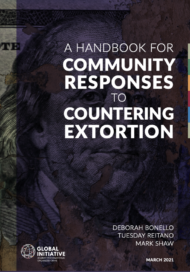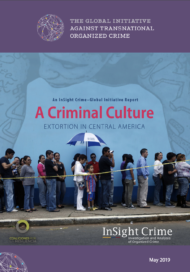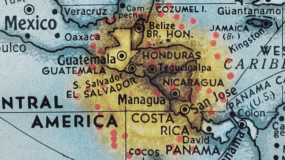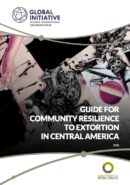Extortion is a pervasive global problem that threatens developing and developed countries alike. Defined as the process of extracting monetary or other forms of payments by means of violence or the threat of violence, extortion now permeates all levels and facets of commerce and reaches into all echelons of society around the world. From large corporations, to small-scale and informal businesses – few are spared its clutches.
Extortion has taken hold in a myriad of contexts, from public-transport networks and informal vendors to public services and utilities, such as education and water distribution, as well as affecting the lives of individuals. The countries where extortion has taken hold vary enormously. The fragile, violence-plagued countries of the Central American Northern Triangle (Guatemala, Honduras and El Salvador) have been crippled by this criminal activity. But they are by no means alone in this global permeating problem: urban powerhouses in Africa and Asia – such as Cape Town, Karachi, Lagos and Hong Kong – as well as significant parts of the US and Europe are also having to deal with serious extortion problems.
The dynamics that allow extortion to embed itself in a particular context or geography may vary, but its impacts tend to be similar. Extortion attacks the order and systems of governance and erodes social confidence in the state. It ultimately reduces the quality of human life, people’s productivity and their right to be free.
The purpose of this handbook is to provide a clear understanding of what extortion is and how it manifests itself in different regions and communities around the world. It identifies successful community– based practices designed to prevent extortion, and proposes recommendations, action plans and guidelines to counter extortion.
La extorsión es un problema mundial generalizado que amenaza tanto a los países en desarrollo como a los desarrollados. Definida como el proceso de extracción de pagos monetarios o de otro tipo mediante la violencia o la amenaza de violencia, en la actualidad la extorsión abarca todos los niveles y aspectos del comercio y llega a todas las esferas de la sociedad alrededor del mundo. Desde las grandes empresas hasta las pequeñas pasando por los negocios informales, pocos se salvan de sus garras.
La extorsión se ha impuesto en multitud de contextos, desde las redes de transporte público y los vendedores informales hasta los servicios públicos como la educación y la distribución de agua, además de afectar la vida de los particulares. Los países en los que la extorsión se ha impuesto varían enormemente. Los países frágiles del Triángulo Norte de Centroamérica (Guatemala, Honduras y El Salvador), asolados por la violencia, se han visto particularmente afectados por esta actividad criminal. Pero no son en absoluto los únicos que se han visto perjudicados por este problema de alcance mundial: los centros urbanos de África y Asia (como Ciudad del Cabo, Karachi, Lagos y Hong Kong), así como partes considerables de Estados Unidos y Europa, también se enfrentan a graves problemas de extorsión.
Las dinámicas que permiten que la extorsión se arraigue en un determinado contexto o geografía pueden variar, pero sus impactos tienden a ser similares. La extorsión ataca el orden y los sistemas de gobierno y erosiona la confianza social en el Estado. En última instancia, reduce la calidad de vida, la productividad de las personas y su derecho a ser libres.
El propósito de este manual es proporcionar una comprensión clara de lo que es la extorsión y cómo se manifiesta en diferentes regiones y comunidades de todo el mundo. Identifica prácticas comunitarias exitosas diseñadas para prevenir la extorsión y propone recomendaciones, planes de acción y directrices para combatirla.





